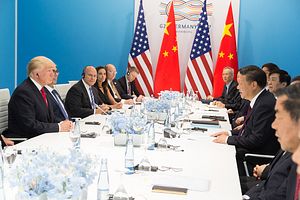Trans-Pacific View author Mercy Kuo regularly engages subject-matter experts, policy practitioners, and strategic thinkers across the globe for their diverse insights into U.S. Asia policy. This conversation with David Fagan – Partner and Co-chair of Covington Burling’s top-ranked practice on cross-border investment and national security matters, including reviews conducted by the Committee on Foreign Investment in the United States (CFIUS), and also leader of the firm’s cyber and data security incident response practice – is the 159th in “The Trans-Pacific View Insight Series.”
Briefly explain the impact of the Foreign Investment Risk Review Act of 2018 (FIRRMA) on Chinese investment in the United States.
While no express reference is made to China in the substantive provisions of FIRRMA, the clear intent of the legislation is to give CFIUS greater visibility into a range of Chinese investment in the United States, and in turn the legislation likely will limit somewhat the totality of Chinese investment in the United States. In particular, FIRRMA applies greater scrutiny to certain equity investments in areas related to critical technologies, critical infrastructure, or businesses with sensitive personal data, as well as certain types of real estate transactions.
Importantly, however, the legislation is not a prohibition on Chinese investment. There remain opportunities for Chinese investment in the U.S., albeit in less sensitive sectors and technologies. As for which industries will receive heightened scrutiny, a good barometer is whether the relevant business or technology is within the scope of the Made in China 2025 Plan. If so, CFIUS will be much more risk averse and exacting in its review.
What is the national security rationale behind FIRRMA?
From the U.S. perspective, there is no historical precedent for the United States’ most consequential economic partner also to be its most significant military and geopolitical rival. This dynamic, coupled with growing U.S. concerns regarding the strategic long-term threat that China could pose to U.S. national security, caused Congress and the Executive Branch to re-evaluate the connectivity and dependency of U.S.-China commercial relations and the laws and regulations governing that commerce. In the field of investment, there were two related concerns in particular: first, that CFIUS lacked visibility into a range of investments from China that might provide coercive influence over U.S. companies, especially leading-edge technology companies; and second, these investments were resulting in technology transfers to China that, while lawful, could convey capabilities that might advance Chinese economic and security interests, while limiting or depriving the U.S. military and national security apparatus from leveraging that technology.
How will FIRRMA affect U.S. companies that seek to attract foreign direct investment?
By broadening the aperture of CFIUS and, for the first time, mandating certain filings, FIRRMA will make CFIUS much more relevant to a range of U.S. businesses that seek to raise foreign capital. FIRRMA won’t preclude such capital raises in any sense, but it will make CFIUS more of a core aspect of capital fundraising and M&A for more businesses than it has been in the past.
How should U.S. companies incorporate FIRRMA requirements in their deal-making?
FIRRMA/CFIUS considerations need to be central to companies’ capital raising and M&A strategies. Smart deal teams will start planning early on and recognize the CFIUS issues, both for inbound investment into their business and for potential divestitures and exits from businesses. The challenge is that unlike other regulatory areas that are routinely part of M&A, such as anti-trust, CFIUS considerations are constantly shifting as national security issues evolve, the national security determinations are not subject to judicial review (thereby limiting available caselaw), and the CFIUS deliberations are completely confidential (further limiting available precedents). As a result, a fulsome CFIUS analysis requires a specialized understanding of how the U.S. government analyzes national security issues, as applied to the particular facts of any transaction, and direct experience handling cases before CFIUS in a given industry.
Assess if FIRRMA is a foreign policy tool for the U.S. policy community to advance U.S. national economic security.
CFIUS is not a particularly effective tool for advancing economic security. Its authorities are limited to national security and are inherently transaction-based. Even with the expanded purview provided by FIRRMA, CFIUS will address only a minority of all foreign investment — and it appropriately does not address outbound investment or trade at all. For those transactions that are reviewed by CFIUS, the Committee is a relatively blunt instrument that is not well suited to applying nuanced economic policy. There are other tools a policymaker would turn to first to assert economic security interests (however those may be defined).

































